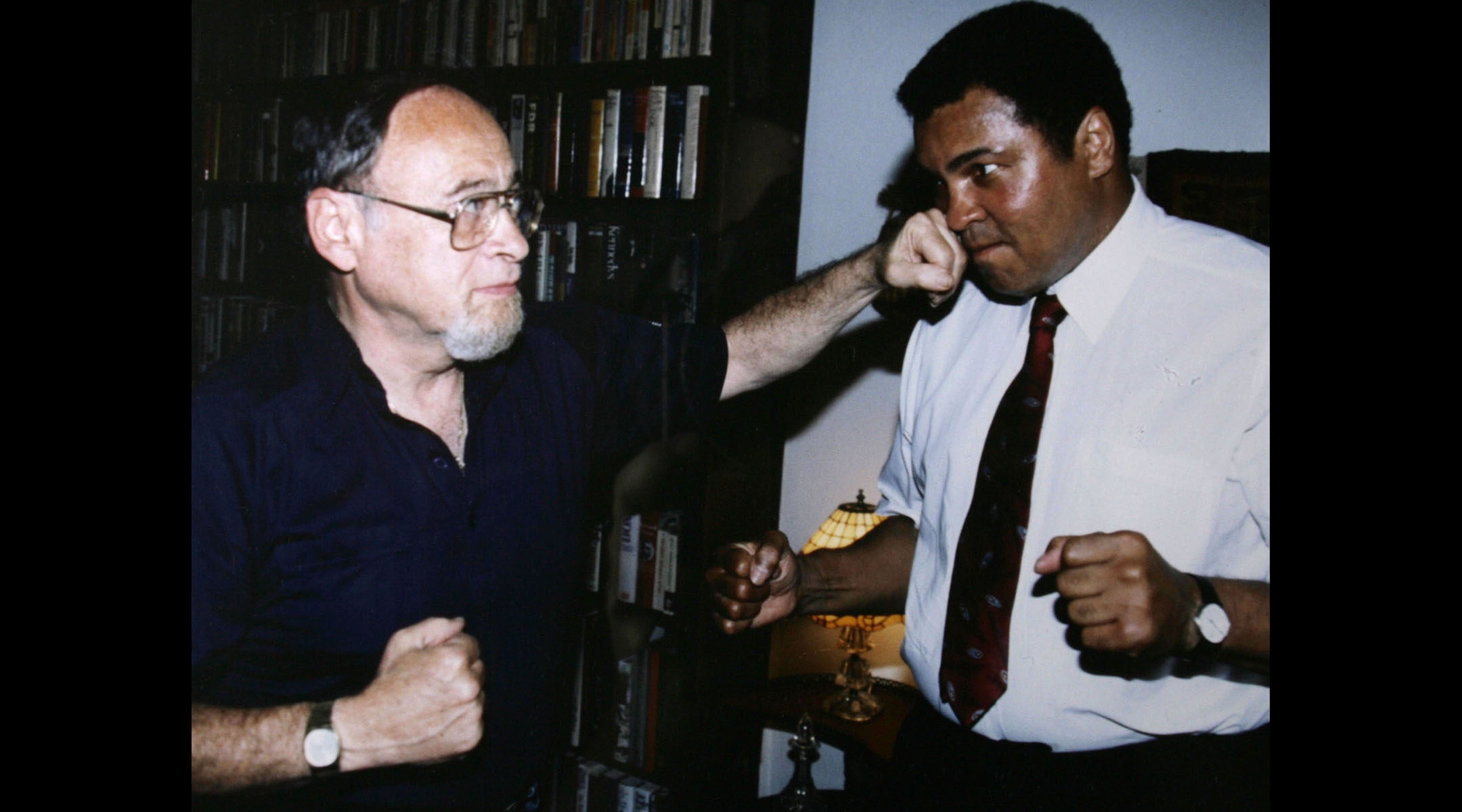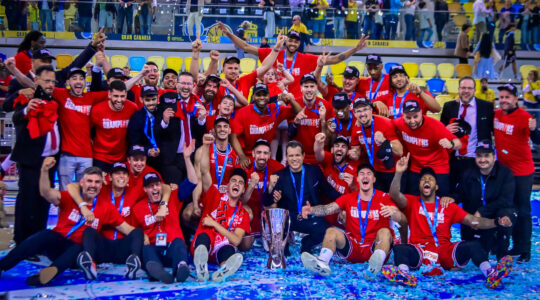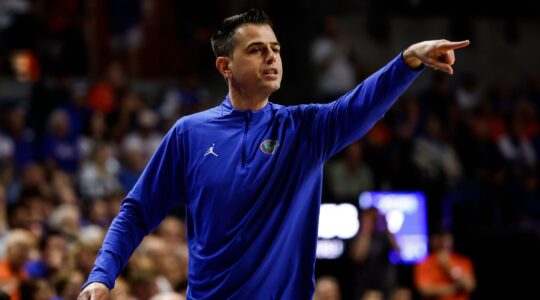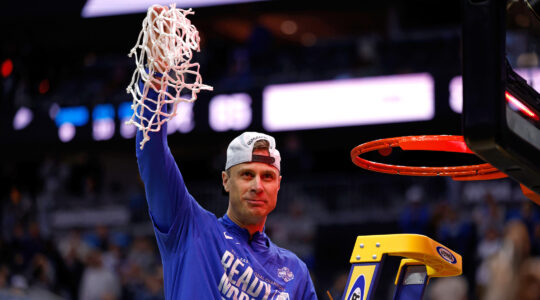(JTA) — Over the course of an illustrious 72-year career as a newspaper reporter, Jerry Izenberg has just about seen it all.
The longtime columnist for The Star-Ledger in Newark, New Jersey, Izenberg covered the first 53 Super Bowls. He’s been to 58 Kentucky Derbies, not to mention numerous Olympics, World Cups and boxing matches. He considered Muhammad Ali a close personal friend.
But the fiery 92-year-old, who still contributes to the paper as a columnist emeritus from his home in Nevada, doesn’t approve of the term “journalist.” He’s a newspaperman.
He dropped the name of Samuel Pepys, the 17th-century British diarist, as a contrast.
“Every day he took his big diary, and he wrote what he did this day, what he was planning to do later — that’s a journalist,” Izenberg told the Jewish Telegraphic Agency. “I’m not in my world. I’m in the world of other people trying to interpret and to repeat what values they have or what lack thereof they have.”
Izenberg’s latest story breaks that rule. His 17th book, which hits shelves on Monday, is a memoir about his Jewish upbringing in Newark. Titled “Baseball, Nazis, and Nedick’s Hot Dogs: Growing Up Jewish in the 1930s in Newark,” the memoir centers on Izenberg’s relationship with his father Harry, a World War I veteran and former minor league baseball player who passed on his love of the sport to his son.
Izenberg’s father emigrated to the United States as a child, leaving Lithuania with his family to escape anti-Jewish pogroms. As his sportswriter son recounts it, Harry discovered baseball even before he could speak English.
The Izenbergs’ love of baseball transcended all. When Jerry got his first baseball glove at ten years old, it was a milestone that in his father’s eyes surpassed even his bar mitzvah. (Maybe unsurprisingly, Izenberg would later skip bar mitzvah tutoring to play baseball after school.)
“He had given me a lifetime gift — a simple game and a simple shared love for it,” Izenberg writes in the memoir. “It remains there, bright and shining in memory eighty-three years later. In the soul of my memory, I see our kind of shared love of baseball again. It never fades.”
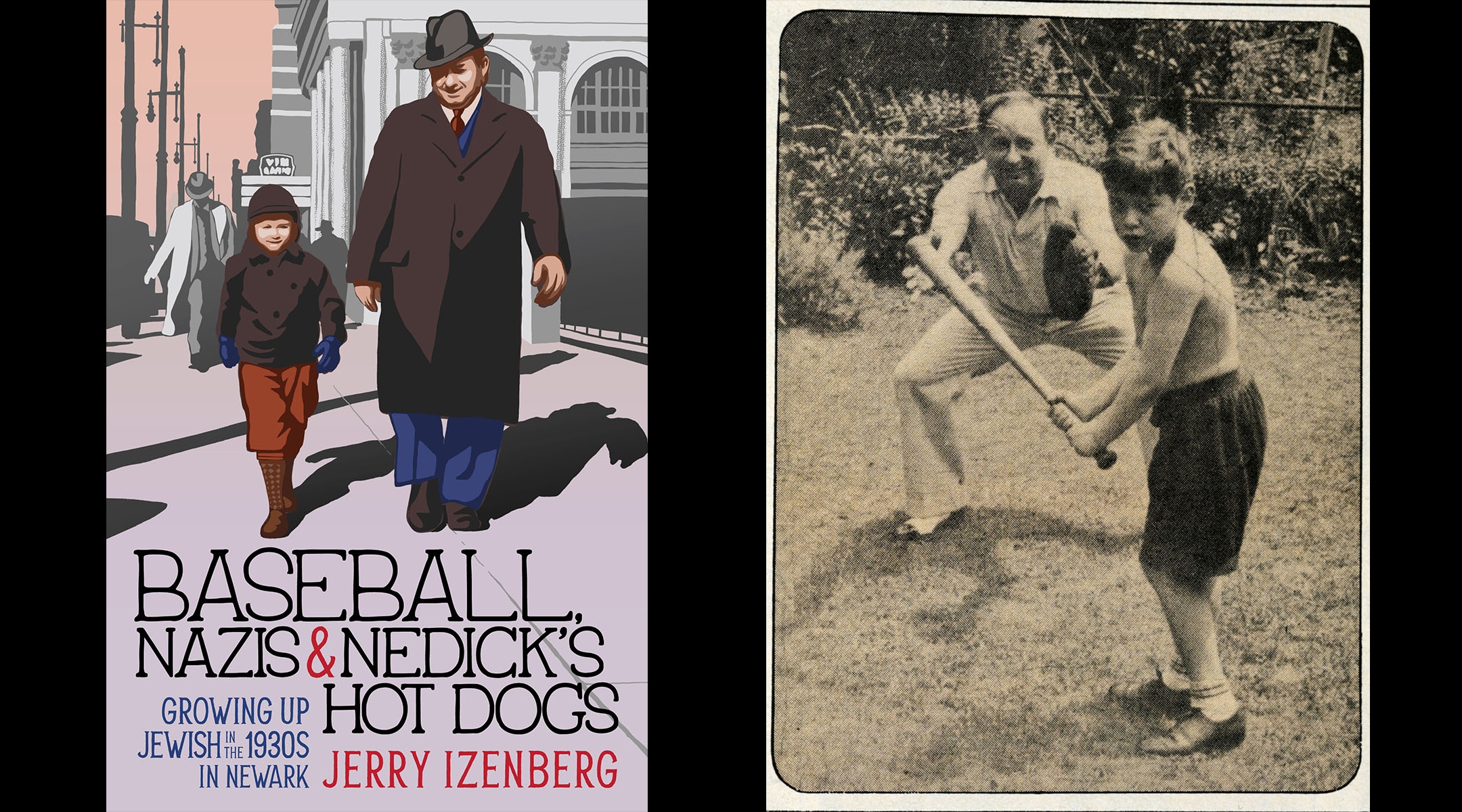
Jerry Izenberg and his father Harry shared a bond over baseball. (Book cover courtesy of The Sager Group, LLC; photograph courtesy of Jerry Izenberg)
The pair’s passion for baseball was closely intertwined with their Judaism. Growing up in Newark in the 1930s and 40s, Izenberg was a fan of the New York Giants baseball team (which left for San Francisco after the 1957 season). They featured a lineup filled with Jewish players: Harry Danning, Harry Feldman and Sid Gordon.
But in the pantheon of Jewish baseball during Izenberg’s childhood, there was a clear king, and — much to the chagrin of Izenberg’s father — he played in Detroit. Hank Greenberg, the greatest Jewish hitter in baseball history, was at the peak of his Tigers career from 1935-1940, winning two most valuable player awards on his way to the Hall of Fame.
At the Izenbergs’ dinner table, there were only a few select topics that were allowed to be discussed: baseball and the Nazis.
In 1938, Greenberg was chasing all-time great Babe Ruth’s single-season record of 60 home runs, which Ruth had set in 1927 with the Yankees. Greenberg would ultimately reach 58 homers, falling just short of history, while drawing several walks in the season’s final games.
“My dad was convinced that was antisemitism,” Izenberg said. “And I said to him, later on when I got into the business and I knew people, ‘did it ever occur to you that the guys who pitched against him didn’t want to be the guy who threw his 60th home run ball? They’d be linked to him forever.’ My father said, ‘That’s an interesting theory, but you’re full of crap.’”
Of all the anecdotes Izenberg shares of his memories with his father, one non-sports related scene stands out. And it has to do with that second dinner table topic.
One Saturday in 1939, Izenberg and his father went to the Newsreel Theatre in Newark, where audiences gathered to watch news and sports highlights of the week. That day, the theater showed footage of the infamous Madison Square Garden rally held by the German-American Bund, the American Nazi organization.
Izenberg remembers leaving the theater with his father, who was visibly angry. His father talked about how the Nazis — or, as he called them, mamzers, Yiddish slang for “bastards” — had to be stopped.
“I’m an 8-year-old kid, and I say, ‘But dad, they’re in Germany,’” Izenberg recalled. “And he looks at me, he says, ‘They’re not in Germany, they’re here.’ And he was right.” Indeed, following Hitler’s rise to power, Nazi-sympathizers could be seen marching down Newark’s streets.
The move theater incident is illustrated on the book’s cover — and was followed by a frequent father-son ritual: getting hot dogs at the popular chain Nedick’s.
To Izenberg, the virulent antisemitism of his youth — including the Bund, the reemergence of the Ku Klux Klan and the rise of Father Charles Coughlin, the antisemitic “radio priest” — is a corollary for the current state of antisemitism, which is again on the rise in the United States, punctuated, he said, by the 2017 antisemitic white nationalist rally in Charlottesville, which he blames on former President Donald Trump.
Izenberg said he doesn’t believe any law can force people to love or even like one another, but that “you could legislate people and pressure people into keeping their damn mouth shut.”
He went on: “And for 30 years, we had that. We got relief from antisemitism… And then one day in Charlottesville, that son of a bitch gave them the license to say whatever they want. And that was a trigger that lit the flame of antisemitism, which then began to grow all at once. It was always in their minds. But it was not fashionable. They made it fashionable.”
Despite the anti-Jewish sentiment that was ever-present in his youth, Izenberg said he has not faced antisemitism in his journalism career. As a columnist who has covered just about every sport, Izenberg has received his fair share of criticism — most notably having his car windows smashed by two men who did not approve of Izenberg’s defense of Muhammad Ali, when at the height of his career the boxer stirred controversy with his support for the Nation of Islam and his refusal to enlist in the military.
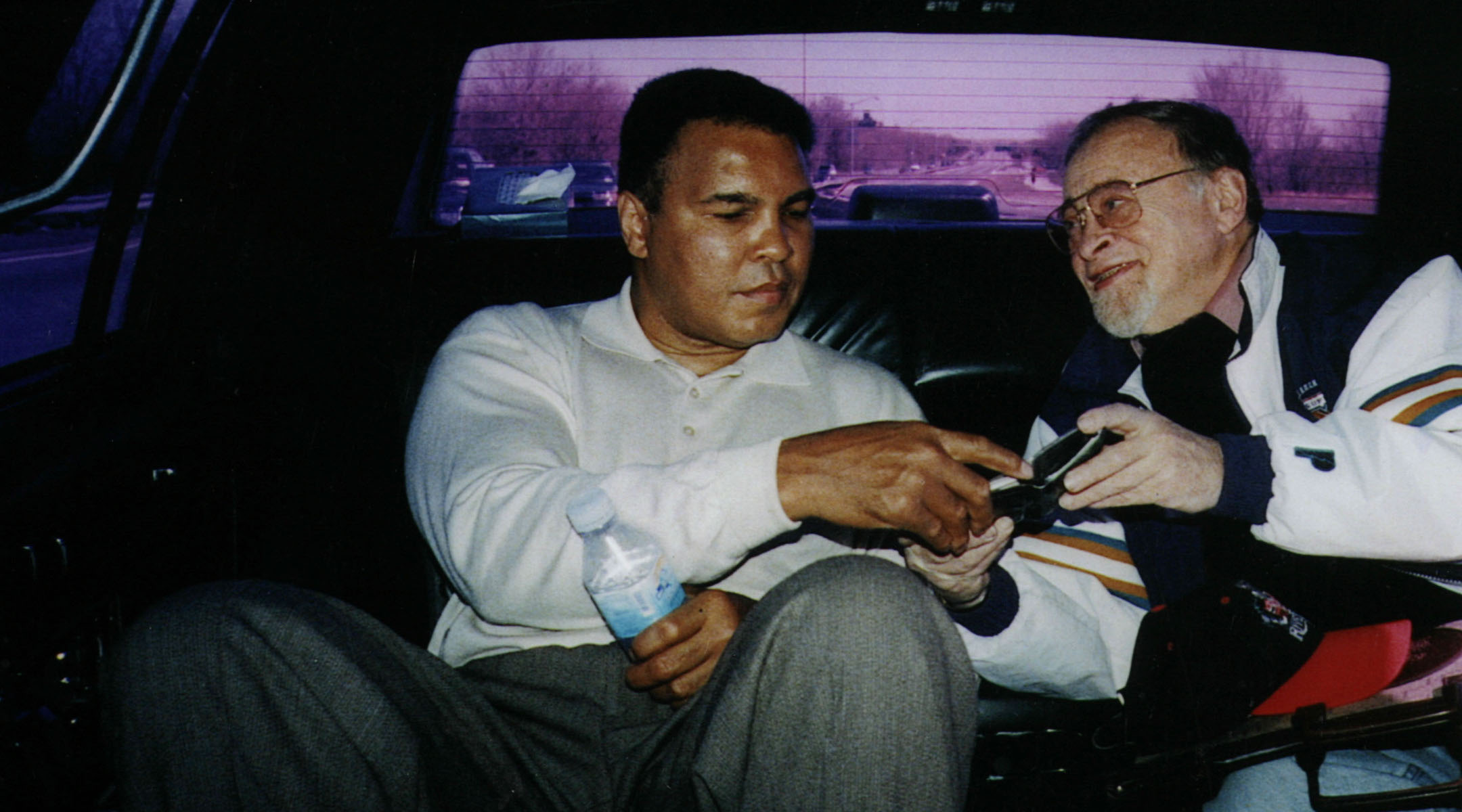
Jerry Izenberg, right, and boxer Muhammad Ali were close personal friends. (The Private Collection of Jerry Izenberg)
Izenberg has written about social issues frequently throughout his career — especially race relations — a tendency that he said is inspired by the value of “tikkun olam,” or repairing the world. It’s an idea he learned from Rabbi Joachim Prinz, the famous activist leader who spoke just before Martin Luther King Jr. at the 1963 March on Washington.
After leaving Nazi Germany, Prinz settled in Newark, on the same block as the Izenbergs. He would become a close family friend, and even offered to help Izenberg prepare for his bar mitzvah, despite the fact that his family belonged to a different synagogue.
Izenberg said he is guided by tikkun olam, “because I know [Prinz would] want me to keep it in the back of my mind, and my father would, too.”
“I’ve always tried not to fix the world — I don’t overrate myself that much — but I could fix the little part of it, the space that I take up,” he added. “And my job was a pathway to that.”
Izenberg’s decades-long career in sports journalism has earned him numerous accolades, including induction into 17 different halls of fame, among them the International Jewish Sports Hall of Fame and the National Sportscasters and Sportswriters Association Hall of Fame.
Along the way, he’s worked with and alongside a number of notable journalists, including ESPN reporter Jeremy Schaap, who previously hosted “Classic Sports Reporters,” for which he invited veteran sportswriters like Izenberg on the show to discuss various topics from sports history.
“For someone like me who really treasures that art form, Jerry was one of its master practitioners, and he’s still doing it, which is amazing,” Schaap told JTA.
Schaap hailed the breadth of Izenberg’s career, which he said epitomized the kind of big-city sports columnist that has become increasingly rare in the digital age.
“He’s a maniac, there’s no other way to put it,” Schaap said with a laugh. “All those Super Bowls, all those fights… the energy, the enthusiasm, the passion, all those things, in addition to the skills, makes him unique and has made him unique for decades.”
Schaap added that he and Izenberg shared a sort of unspoken bond over their Jewishness, and that Izenberg has taught Schaap a few Yiddishisms over the years. Izenberg’s tendency to slip Yiddish into his prose is evident in the memoir, from a comical retelling of his bris in the prologue to the frequent frustrated “genug” (“enough”) he heard from his mother as a child.
Ultimately, Izenberg said his parents represent the tachlis — the bottom line — of the memoir, and what he hopes readers take away from it. Izenberg said writing the memoir was cathartic for him, and that it even serves as a sort of love letter to his father.
“We were not, you know, ‘I love you dad,’” Izenberg said. “We were very respectful, but we didn’t express it. I tried to express it in this book. I hope I did.”
The release of Izenberg’s memoir is in no way a sign that the nonagenarian is slowing down. Even though he claims he works less than he used to, Izenberg said he plans to write six columns about next weekend’s Kentucky Derby.
He already has plans for his next few books, too — including a biography of New Jersey’s own Larry Doby, who was the second Black player in the MLB and first in the American League.
“I’ve had a great life, and I’m having a great life, but I ain’t done yet,” Izenberg said.
JTA has documented Jewish history in real-time for over a century. Keep our journalism strong by joining us in supporting independent, award-winning reporting.
